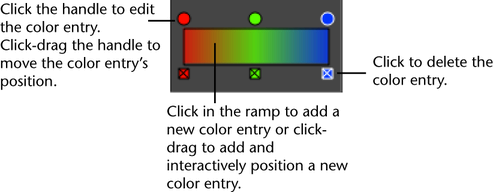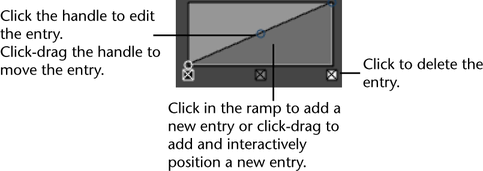For a description of Maya’s Volume Light, see Create > Lights > Volume Light.
See Type.
See Color.
See Intensity.
The colorRange is the color of the light from the center to the edge of the volume. By changing the values on the ramp (gradient) you can decay or change color along the defined light direction. The right side of the ramp represents the light color at the center of the volume. The left side is the color at the outer boundary. The effect of decay is accomplished by the interpolation (blend) from the inner color to the outer color. The outermost color should be black to avoid a hard boundary at the volume edge.

Controls the way colors blend in the ramp. Select an option from the drop-down list: None, Linear, Smooth, Spline. The default is Linear.
Use this option to create a partial sphere, cone, or cylinder light shape by specifying a degree of rotation. Values can range from 0 to 360 degrees. The most common settings are 180 and 360, the default. 180 is similar to slicing the light volume in half and 360 is the full light. This option does not apply to the box light shape.
If turned on, light affects surfaces in a multi-directional manner. The default is off.
When combined with Emit Diffuse, the lighting of a surface is 50% of the surface/light angle, and 50% in a non-directional fashion. If Emit Diffuse is off then the light is totally omnidirectional.
If Emit Diffuse and Emit Specular are off and Emit Ambient is on, the light behaves like an ambient light with decay and a bounded range. This is quite useful for adjusting lighting. It can be used with negative light intensity to pull light out of defined regions.
This section applies to cone and cylinder light shapes only. This contains attributes for managing the penumbra, the area of partial illumination around the shadow border and the light. Using the graph you can adjust the spread and the dropoff of the light. The left side of the graph represents the intensity at the outer edge of the cone or cylinder and the right side represents the intensity from the center of the beam to the edge.

 Except where otherwise noted, this work is licensed under a Creative Commons Attribution-NonCommercial-ShareAlike 3.0 Unported License
Except where otherwise noted, this work is licensed under a Creative Commons Attribution-NonCommercial-ShareAlike 3.0 Unported License